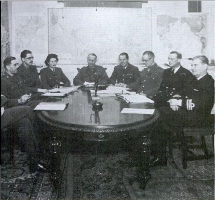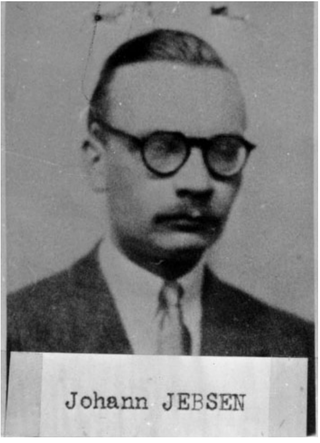The Double-Cross System or XX System was a World War II counter-espionage and deception operation of the British Security Service (MI5). Nazi agents in Britain – real and false – were captured, turned themselves in or simply announced themselves, and were then used by the British to broadcast mainly disinformation to their Nazi controllers. Its operations were overseen by the Twenty Committee under the chairmanship of John Cecil Masterman; the name of the committee comes from the number 20 in Roman numerals: "XX".

Operation Fortitude was a military deception operation by the Allied nations as part of Operation Bodyguard, an overall deception strategy during the buildup to the 1944 Normandy landings. Fortitude was divided into two subplans, North and South, and had the aim of misleading the German High Command as to the location of the invasion.

Operation Bodyguard was the code name for a World War II deception strategy employed by the Allied states before the 1944 invasion of northwest Europe. Bodyguard set out an overall stratagem for misleading the Oberkommando der Wehrmacht as to the time and place of the invasion. Planning for Bodyguard was started in 1943 by the London Controlling Section, a department of the war cabinet. They produced a draft strategy, referred to as Plan Jael, which was presented to leaders at the Tehran Conference in late November and, despite scepticism due to the failure of earlier deception strategy, approved on 6 December 1943.
Operation Mincemeat was a successful British deception operation of the Second World War to disguise the 1943 Allied invasion of Sicily. Two members of British intelligence obtained the body of Glyndwr Michael, a tramp who died from eating rat poison, dressed him as an officer of the Royal Marines and placed personal items on him identifying him as the fictitious Captain William Martin. Correspondence between two British generals that suggested that the Allies planned to invade Greece and Sardinia, with Sicily as merely the target of a feint, was also placed on the body.

Operation Copperhead was a small military deception operation run by the British during the Second World War. It formed part of Operation Bodyguard, the cover plan for the invasion of Normandy in 1944 and was intended to mislead German intelligence as to the location of General Bernard Montgomery. The operation was conceived by Dudley Clarke in early 1944 after he watched the film Five Graves to Cairo. Following the war M. E. Clifton James wrote a book about the operation, I Was Monty's Double. It was later adapted into a film, with James in the lead role.

Operation Ironside was a Second World War military deception undertaken by the Allies in 1944. It formed part of Operation Bodyguard, a broad strategic deception plan instigated by the Allies throughout the year to help cover the June 1944 invasion of Normandy. Ironside supported the overall deception by suggesting to the Germans that the Allies would subsequently land along the Bay of Biscay. It complemented efforts to deceive the Germans into believing that the Allies would also land in southern France at this time. Bordeaux was an important port for the German war effort and had already been a target of commando raids two years earlier. Ironside intended to play on German fears of an invasion in the region, with the aim of tying down defensive forces following Operation Overlord in June 1944.

Operation Zeppelin was a major military deception operation run by the British during the Second World War. It formed part of Operation Bodyguard, the cover plan for the invasion of Normandy in 1944, and was intended to mislead German intelligence as to the Allied invasion plans in the Mediterranean theatre that year. The operation was planned by 'A' Force and implemented by means of visual deception and misinformation.

Operation Titanic was a series of military deceptions carried out by the Allied Nations during the Second World War. They formed part of tactical element of Operation Bodyguard, the cover plan for the Normandy landings. Titanic was carried out on 5–6 June 1944 by the Royal Air Force and the Special Air Service. Its objective was to drop hundreds of dummy parachutists, noisemakers and small numbers of special forces troops in locations away from the real Normandy drop zones. It hoped to deceive the German defenders into believing that a large force had landed, drawing troops away from the beachheads and other strategic sites.

The London Controlling Section (LCS) was a British secret department established in September 1941, under Oliver Stanley, with a mandate to coordinate Allied strategic military deception during World War II. The LCS was formed within the Joint Planning Staff at the offices of the War Cabinet, which was presided over by Winston Churchill as Prime Minister.
Operation Cascade was the codename for an Allied military deception operation during the Western Desert Campaign of World War II for North Africa. Operation Cascade was one of the first successful Allied deception operations in World War II, and provided valuable experience for later operations.

Operations Taxable, Glimmer and Big Drum were tactical military deceptions conducted on 6 June 1944 in support of the Allied landings in Normandy. The operations formed the naval component of Operation Bodyguard, a wider series of tactical and strategic deceptions surrounding the invasion.
Operation Hardboiled was a Second World War military deception. Undertaken by the Allies in 1942, it was the first attempt at deception by the London Controlling Section (LCS) and was designed to convince the Axis powers that the Allies would soon invade German-occupied Norway. The LCS had recently been established to plan deception across all theatres, but had struggled for support from the unenthusiastic military establishment. The LCS had little guidance in strategic deception, an activity pioneered by Dudley Clarke the previous year, and was unaware of the extensive double agent system controlled by MI5. As a result, Hardboiled was planned as a real operation rather than a fictional one. Clarke had already found this approach to be wasteful in time and resources, preferring to present a "story" using agents and wireless traffic.

Bodyguard of Lies is a 1975 non-fiction book on Allied military deception operations during World War II written by Anthony Cave Brown. His first major historical work, it derives its name from a wartime quote of Winston Churchill, and offers a narrative account of aspects of both the Allied and German intelligence operations during the war. The British and American governments resisted Brown's attempts to research the book. Many of the topics were still classified and he was denied access to British war records. The material in the book is predominantly based on oral testimony as well as some American records, declassified toward the end of Brown's research.
Ops (B) was an Allied military deception planning department, based in the United Kingdom, during the Second World War. It was set up under Colonel Jervis-Read in April 1943 as a department of Chief of Staff to the Supreme Allied Commander (COSSAC), an operational planning department with a focus on western Europe. That year, Allied high command had decided that the main Allied thrust would be in southern Europe, and Ops (B) was tasked with tying down German forces on the west coast in general, and drawing out the Luftwaffe in particular.

R Force was a British deception force during World War II that consisted of armoured vehicles, field engineers and a wireless unit. During Operation Fortitude it attempted to exaggerate the strength of Allied forces in Britain, and deceive German intelligence about Allied intentions. Later it performed a similar role during the fighting in Western Europe in 1944–45. It was commanded by Lieutenant Colonel David Strangeways.

Colonel John Henry "Johnny" Bevan was a British Army officer who, during the Second World War, made an important contribution to military deception, culminating in Operation Bodyguard, the plan to conceal the D-Day landings in Normandy. In civilian life he was a respected stockbroker in his father's firm.

Operation Graffham was a military deception employed by the Allies during the Second World War. It formed part of Operation Bodyguard, a broad strategic deception designed to disguise the imminent Allied invasion of Normandy. Graffham provided political support to the visual and wireless deception of Operation Fortitude North. The operations together created a fictional threat to Norway during the summer of 1944.

Johann-Nielsen Jebsen, nicknamed "Johnny", was an anti-Nazi German intelligence officer and British double agent during World War II. Jebsen recruited Dušan Popov to the Abwehr and through him later joined the Allied cause. Kidnapped from Lisbon by the Germans shortly before the Normandy landings, Jebsen was tortured in prison and spent time in a concentration camp before disappearing; he was presumed killed at the end of the war.

Operation Ferdinand was a military deception employed by the Allies during the Second World War. It formed part of Operation Bodyguard, a major strategic deception intended to misdirect and confuse German high command about Allied invasion plans during 1944. Ferdinand consisted of strategic and tactical deceptions intended to draw attention away from the Operation Dragoon landing areas in southern France by threatening an invasion of Genoa in Italy. Planned by Eugene Sweeney in June and July 1944 and operated until early September, it has been described as "quite the most successful of 'A' Force's strategic deceptions". It helped the Allies achieve complete tactical surprise in their landings and pinned down German troops in the Genoa region until late July.








